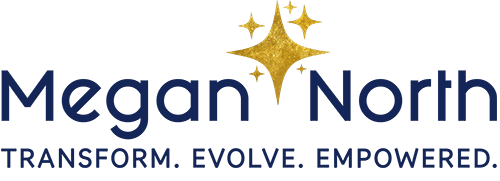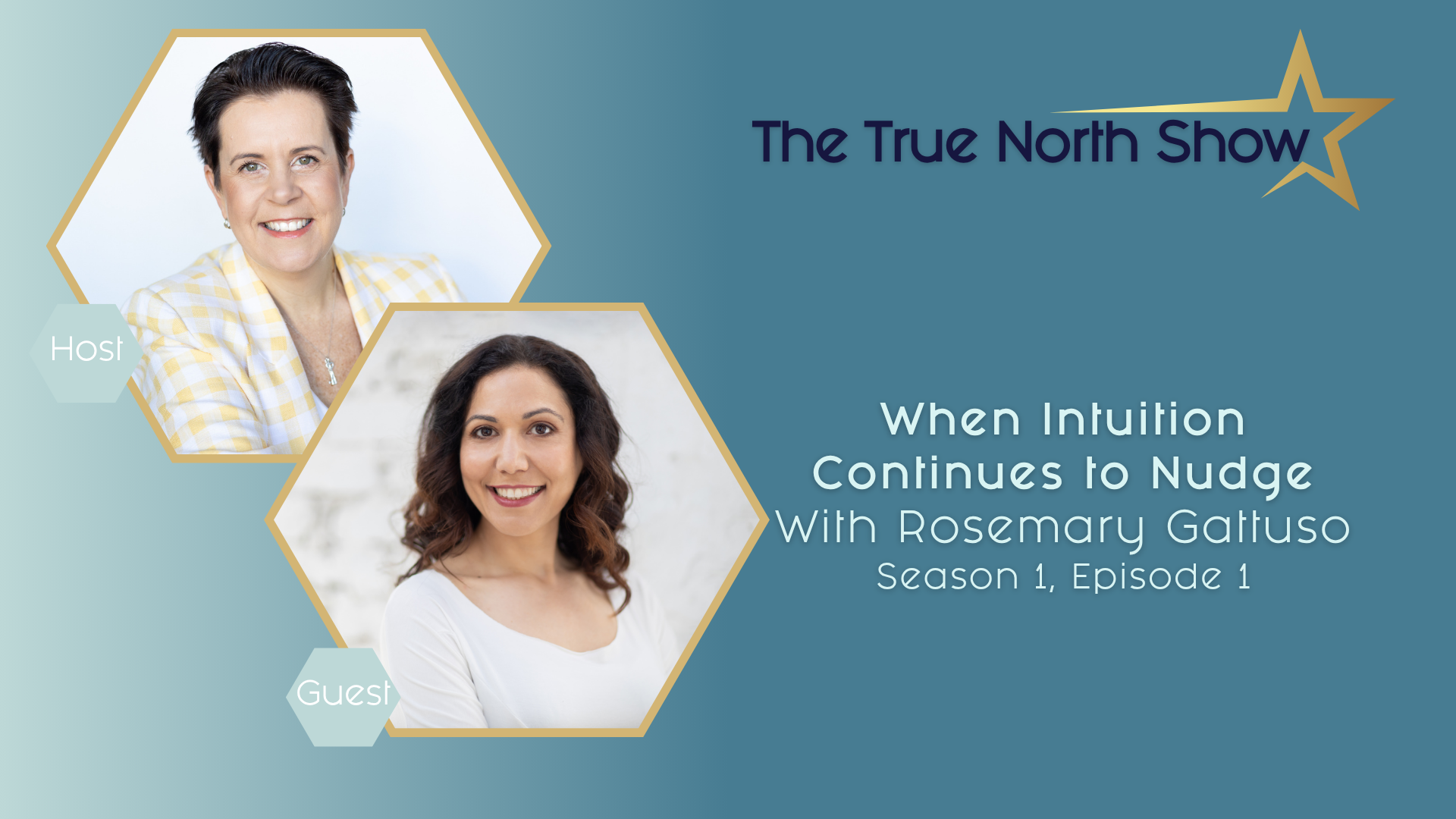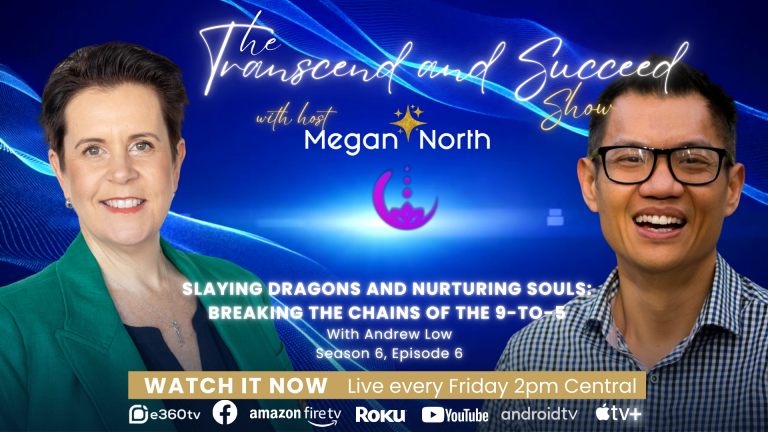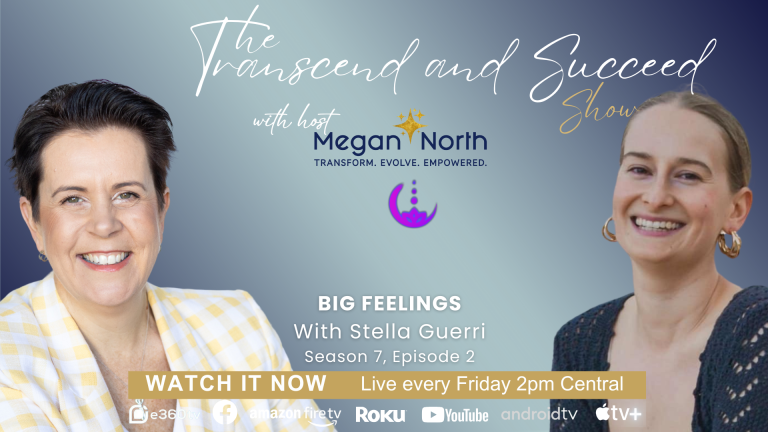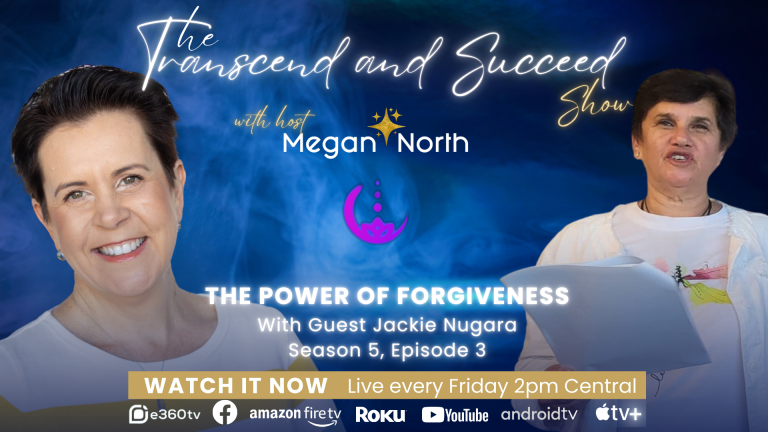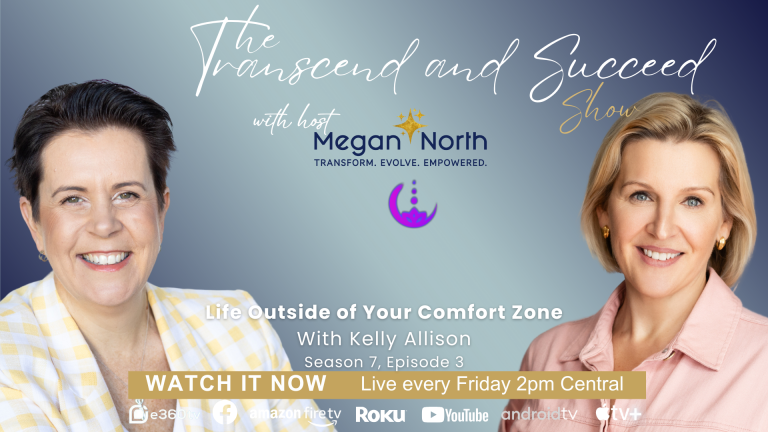Episode 1 – When Intuition Continues to Nudge with Rosemary Gattuso
Overview
In this powerful first episode of The True North Show, I sit down with the inspiring Rosemary Gattuso, a woman who dared to make a bold shift toward living in alignment with her true purpose. Together, we dive into her journey of change – what sparked it, how she stayed grounded through it, and the practices she uses to prioritise her mental health along the way.
Rosemary shares a game-changing moment from her time at Harvard, when one teacher’s words completely reframed how she saw herself. It’s a moment that will give you goosebumps—and perhaps the nudge you’ve been waiting for to step into your own truth.
If you’re ready for honest conversation, soulful insight, and a big dose of inspiration, this is the episode to start with.
Show Links:
Her book, It’s Not You, It’s Me! A Chronic Overthinker’s Guide to Self-Reflection, reflects her journey from chronic over-thinker to reflective practitioner, aiming to inspire positive change in individuals and communities. Purchase the book here: https://a.co/d/57U5lHd
Social Media
- Website: www.rosemarygattuso.com
- Facebook: https://www.facebook.com/rosemarygattuso
- Instagram: https://www.instagram.com/rosemarygattuso/
- LinkedIn: https://www.linkedin.com/in/rosemarygattuso/
Transcript:
Megan North (0:00)
Hello and welcome to the very first episode of The True North Show, a show where we dive into the pivotal moments that ignite our guests’ passion, uncover the stories behind their purpose, and reveal the real life strategies they use to stay balanced and prioritize mental wellbeing. Get ready for inspiring conversations that light the way to living with intention, resilience, while following your true north.
For those of you who don’t know me, I’m your host, Megan North, and I would like to thank our sponsors of the show, Quantum Awakening, Beth Lewis, Anne C. Clark, and our lovely guest, who paid to be featured on this episode. Now talking about our lovely guest, for our first episode, we’re joined by Rosemary Gattuso, who is no stranger to appearing on shows with me. Rosemary is a specialist in family mediation and restorative justice.
focusing on respect and children’s wellbeing during separations. She serves on restorative justice panels and advocates for a trauma-informed, strengths-based approach. Rosemary has a background in law, couples and family therapy, and family dispute resolution with advanced studies from Harvard University. Rosemary leads workshops on trauma-informed living and strength-based practices. Her book,
It’s not you, it’s me, a chronic overthinkers guide to self-reflection reflects her journey from chronic overthinker to reflective practitioner aiming to inspire positive change in individuals and communities. So welcome to the show, Rosemary. Thank you so much for joining me again today.
Rosemary Gattuso (02:26)
Thanks, Megan. It’s just wonderful to be here and be part of your first show. I’m so excited about today.
Megan North (02:33)
So let’s dive in. So Rosemary, what was the defining moment that led you to pursue your true passion and purpose?
Rosemary Gattuso (02:43)
Well, this is an interesting question because it’s really a series of pursuing what I thought I wanted and where I thought I needed to be and realizing that it wasn’t. ⁓ And so one of the pivotal moments that really then led me on ⁓ this path was really ⁓ when I was at the very end of my studies.
And I studied law and there was a compulsory mediation section that everyone had to do and everyone hated it except for me. And I thought, ⁓ this is where I need to be. And it was one of those moments where I realized that, you know, it doesn’t matter about the circumstances. It’s the feeling that we have because I was pursuing something that made me focus on me not being good enough and that I had to do better.
And that it was a challenge and not in a way that, you can learn something and get better at it, but it was just, didn’t suit my personality and my characteristics and my natural way of being. Whereas mediation did. And so then that kickstarted a series of events that, you know, over almost 20 years, you know, of me pursuing mediation, alternative dispute resolution, and then looking at
⁓ being trauma-informed and basically out of my own curiosity around human behavior, around what I was seeing in mediation rooms, the way that people managed adversity, the differences that I saw and the way we put meaning to our experience. So then that led me down, you know, kind of the therapeutic path and exploring, you know, that area which really got me here today.
Megan North (04:38)
And do you think then that there’s ⁓ in law, and I’m really general generalizing here, but do you think that there’s kind of two types of people in the sense of people who love the books and the black and white and these are the rules and then the people like you who who like that but then miss the one-on-one and the connection with people?
Rosemary Gattuso (04:59)
I think there is, but it’s also about tradition and what we’re used to because we’re used to an adversarial approach where it’s us versus them and you have to win and someone’s always wrong. Yeah, so it’s also a shift in that mindset.
Megan North (05:15)
Yes, yes. And I could imagine then when you would, know, with particularly because you work with the children that are part of parents that are divorcing for kids, it’s not about who’s wrong or right or who’s going to win. It’s like, what is the best outcome for them?
Rosemary Gattuso (05:34)
Yes. And actually I never meet with the parents. Sorry, I never meet with the children. I only meet with the parents, but work with the parents as if the children are in the room, you know, and really bring them into the room, you know, and whether or not that’s through sort of reflective activities with the parents talking about what the children’s needs are to child’s needs exercise. What, what does this individual child need as opposed to the others, you know, in the classroom?
or even as opposed to the siblings. And then how can both parents then work together to support that very child-centered and child-focused, but not only child-focused, but on that individual child, because you’ll have children who are more sensitive than others in the same family, and then we’ll need a slightly different approach.
Megan North (06:25)
And do you think that that’s the type of person that you’ve always been? Like, when you think back about when you were a child or a teenager growing up, was fairness something that was really important to you?
Rosemary Gattuso (06:39)
Yes, it’s really the only thing that irks me when there is injustice and not just injustice, but something quite ⁓ serious. Like I can live with not having the same amount of fries on my plate, you know, but it’s quite, you know, I don’t know, I guess it’s when it’s something that goes towards my fundamental values when there’s injustice in that area. That’s where
it really irks me. Like I can let a lot of things sort of slide and have it generally a calm sort of personality and way of responding in general. But this idea of, ⁓ you know, unfairness and I mean, as a side note, and I don’t know, you know, I am also Libran and you know, my star sign is, ⁓ know, balance or control.
I’m thinking in Italian now. can’t remember. Scales. my gosh. Scales. I don’t know, maybe it’s also just part of me, yeah, I can take some sort of injustice, but when it’s severe and fundamental, that’s just, it’s not on. that’s something that’s always been a part of me.
Megan North (07:37)
I’ll be there.
you
Yeah, yeah. And when you talked about your values, are your values ⁓ something that really help you to make decisions in life? they sort of at the top and forefront of, ⁓ am I going to make this decision this way or that way? Do your values come into that?
Rosemary Gattuso (08:22)
Yeah, I think they definitely do. you know, I guess it also depends on the situation and whatever the decision is. you know, I tend I will prioritise what’s important and of great value ⁓ to me and probably spend more time with it there. ⁓ And because it has more meaning, regardless of what what the decision is or what
If it’s important, something that’s really important to me, then ⁓ that’s where I put my time and effort.
Megan North (08:56)
Yeah, yeah. I find that ⁓ my values are kind of the last tick in the box. My intuition will tell me immediately, but then when I then stack it up to, does this fit with my values, my core values of me personally, but then also in my business, it’s a really easy decision to make. Because if it’s intuition says yes, but not necessarily with the core values, then I’ll be like, okay, I’m not going to.
make that decision but I mean usually my intuition is telling me yes and then it’ll align with my core values.
Rosemary Gattuso (09:31)
Yeah, no, it’s a great one because intuition is so, it’s so important and so valuable when we’re in the right space to call on it. Because I will often get judgment, my own judgment on a situation and how things should or could be done mixed up for intuition.
And so that’s where, you know, one of the things that I do is I look at, well, is this a judgment? And normally it’s a negative judgment. A negative judgment about something to then instigate me doing something or not doing something, which I might umbrella as intuition. ⁓ But it might be if I don’t do X, then Y will happen. So it’s very logical and has a…
sort of a sequence of events will happen. For me, that’s a clue that it’s not actually my intuition. It’s my fear disguised as intuition, my judgment disguised as intuition. Because intuition is not logical. But if there is a bit of logic to it, ⁓ then maybe, I mean, it’s not the end rule, it’s not, but this is, it’s a guide for me.
Megan North (10:44)
Yeah, yeah. And it’s very rare that your intuition is wrong.
Rosemary Gattuso (10:50)
Yes. We just have to listen for it. Sometimes we don’t listen to it. And that’s actually, that’s the time when we learn how to listen to our intuition when we don’t listen to it. And we think, gosh, there was something inside me coming up about this, but I didn’t listen.
Megan North (11:08)
Yeah, or it just didn’t feel right or something was just a bit off. Yeah.
Rosemary Gattuso (11:13)
Yeah.
And so that’s where we get the clues as to what intuition feels like for us when we miss it.
Megan North (11:19)
Yeah, yeah, I love that. I love that. So as you’re pursuing your passion and your purpose and you’re continually growing and developing, because I know you a little bit more, so I know that you’re always wanting to be a better version of yourself. How do you maintain balance and prioritize your mental well-being in the midst of pursuing your dreams?
Rosemary Gattuso (11:44)
Well, this is really about being aware of the clues or the hints that our body gives us. Because when we’re in balance, we feel fine. We can manage, we can juggle, or we might get a little bit stressed, which isn’t normal, but it won’t overtake us and we won’t feel that overwhelmed and that helplessness and despair or resentment, anger, all those things can come to the surface. ⁓
then for me the guide is when I am feeling overwhelmed, when I am feeling despair, when I even have muscle soreness, all those signs for me are that I’m not in balance and for me to continue to do what I want to do, then I need to get in balance or it could also be that I’m doing too much to maybe take a little bit of a ⁓ step back and delegate or outsource whatever I can as well.
Megan North (12:36)
Hmm.
Rosemary Gattuso (12:45)
But it’s just about looking for the clues. And anything that feels heavy is a clue.
Megan North (12:51)
Yeah.
Yeah.
Rosemary Gattuso (12:55)
You
know, and sometimes I can be quite good at having a routine of kind of self-care and balance and just have those appointments slotted in, whether or not it is a physical appointment where I go somewhere for a massage or acupuncture or whatever it is, or just mentally slot out the time to go to Pilates or to go for a walk or to go out with my friends or to just have a night at home.
Megan North (13:23)
Yeah.
Rosemary Gattuso (13:24)
So whether or not, I can often get good at that, but I’m also good at getting out of that routine. Getting into it and then getting out of it. And then sometimes it’s not sustainable to do everything at once. So it’s also about prioritizing. And prioritizing the commitments and the self care.
Megan North (13:48)
Yeah. And I also think too is that, ⁓ you know, as you said, like you sometimes you’re you’ve got lots of things booked in, but then you either get out of routine or other things take priority. I think at that moment as well is that even if we take five minutes and do some breathing or we walk outside in the fresh air and we come back in, I think that we always need to remember that it’s even just those micro moments that can actually be self care.
Because I think when we’re overwhelmed and we’re thinking, my gosh, I really need to get this, this and this done. Okay, I’m not gonna do that today or I’m not gonna do my Pilates class. It doesn’t mean that the whole day is wasted. It just means that, okay, well, where can I get a five minute meditation in or a quick walk around the block? And I think that we forget that. it’s either all or nothing, but actually it doesn’t need to be there.
Rosemary Gattuso (14:44)
Yeah, that’s such a great point because sometimes for me when I get out of routine, it means that I’ve got a lot on my plate and even making the time to go to have a massage is like, my gosh, I can’t do this. It’s a whole hour. Plus I have to get there and then get, you know, and going through that, then that’s also a sign that, well, it’s supposed to help, but it’s not helping at the moment. So what could help? What could help is having the afternoon free, you know.
Yeah. You and as you said, going for a walk around the block, you know, exploring where I live at the moment in Sydney, there’s lots of really nice bakeries and cafes within walking distance. And so it’s a little bit of an adventure to do like walk in one direction for eight minutes and then come back, you know, and discover, ⁓ there’s a new coffee place there. Okay, I can go there. Well, they also sell bread. Okay. When I run out of bread,
Megan North (15:33)
Yeah.
Rosemary Gattuso (15:43)
or walk there and then I’m getting nutrition and I’m getting exercise. It’s, you know, sort of killing two birds with one stone, but I feel good.
Megan North (15:51)
Yeah, yeah. And I think we need to remember that because I think it’s then those little micro moments then actually can just help through your day when you actually don’t have the time to do the bigger things. It’s almost like finding, ⁓ you know, on a range of time from an hour to half an hour to 15 minutes to 10 to five minutes, you know, it’s almost getting a whole heap of those in your toolkit so that when you can’t do the hour.
Do I have half an hour? Well, no, but I’ve got 15 minutes. Okay. What’s in my little 15 minute bucket that I can do.
Rosemary Gattuso (16:25)
That’s right. And I guess for me, I really like ⁓ writing to do lists. And this is something that’s really important and helpful for me. But I realized that it wasn’t necessarily about the list, but how it made me feel because it helped me and it helped me to believe in myself because I can write down a list and get things done and I feel accomplished. And see, even that to me is an interaction that I’m having with myself that gives me evidence of my worth.
Megan North (16:39)
Yeah.
Rosemary Gattuso (16:56)
And even if I don’t get everything done on the list, I’ll just put it on the list for tomorrow. And that has been sort of part of my sort of routine each night, write a list for the next day so that I know, tick off what I did, put what I haven’t done on the list for tomorrow.
Megan North (17:11)
Yeah, yeah,
yeah. Because I think that most people, I think, need to be a little bit organized when they’re following their passion, their purpose, making, know, if you’re running your own business, you’re doing what you’re loving. But then also if you’re making sure that your mental health and your well-being is being looked after, I think some type of list or some type of guidance you almost need. Otherwise, you’ll just be in that total panic, I think.
Rosemary Gattuso (17:40)
And I think what I find also is that time goes really quickly. So you know, I start something and then a week passes and then another week passes. And before I know it, a month has passed and I haven’t finished that one task. So that’s where, you know, the to do list or any sort of ⁓ method that works. know, I’ve ⁓ learned how to schedule emails to myself.
Megan North (17:54)
Yeah.
Rosemary Gattuso (18:08)
had to schedule emails generally. And so I send myself an email on a certain date to know to remind me that I have to do something today. So I’ll get that and that’s been quite helpful. And even if it’s to follow up someone, then I’ll put a summary in the email of what I’ve done. And then so, you know, when I have to do the follow up in two weeks time or whatever the timeframe is, I’ve got the summary in front of me. Plus I got the reminder because I check my email all the time. ⁓
Megan North (18:25)
Yeah.
Rosemary Gattuso (18:37)
So I’ll see it and I’ll act on it.
Megan North (18:40)
That’s a great idea because I’ll often have things like I’ll often email myself to say, I need to do this, this and this and I’ll do them individually emails. But I do them at that time, but I know I don’t need to do it for a couple of weeks. So it constantly sits in my inbox. I leave it as unread. So it’s flashing at me, but that’s a great idea. I think I might try that because looking at it, I’m thinking, my gosh, I haven’t done that yet. no, it’s okay. I don’t need to do it yet.
Rosemary Gattuso (19:11)
It’s actually changed a lot of the way that I work just using this and I’ve only used Gmail using this tool to either send myself ⁓ emails in the future or even other people who I’m you know trying to collaborate with or working with in some way who have said well can you get back to me in July? I’m not gonna remember so I’ve just got that email waiting for July ⁓ and it’ll get sent out to her straight away and she’ll get it or
or a reminder for me to then follow it up. But it’s been really good. send one email and then I can automatically have the follow-up to that email ready to go in two weeks. I just have to remember if I’ve heard from them and I don’t need to follow it up or whatever, but you just make up a system that works.
Megan North (20:00)
Yeah, that’s fantastic. That’s a great tip. Amazing. All right. Well, on that note, we’re going to hear from our sponsors. So we’ll we’ll be back in a couple of minutes ⁓ and then we’re going to explore ⁓ more about you. And ⁓ we’re going to specifically talk about a significant, significant challenge that you faced and how you’ve overcome it and how you’ve stayed aligned. So ⁓ stay with us and we’ll be back in a couple of minutes.
Rosemary Gattuso (20:30)
Mm-hmm. ⁓
you
Megan North (22:11)
So Rosemary, can you share a significant challenge that you faced and how you overcame it and how you overcame it to stay aligned with ⁓ with your purpose?
Rosemary Gattuso (22:34)
And I think there’s probably quite a few points that a few examples that I could give. And the real, I’ll give you the theme. The theme is me pursuing the wrong path and then being pushed onto the right path. so for many years I worked in the public sector and it was in alternative dispute resolution. So it was still sort of in my realm, complaints management, mediation.
And I was constantly trying to get a promotion. I wanted to go up the ladder, you know, that’s, I guess, what you do in work, whether or not it’s corporate or public sector, you want to improve ⁓ and go further. And I found particularly in the public sector, there was a strong ⁓ just way of being that that’s what you did. You wanted to get up to the next.
the next stage. And ⁓ I guess I kept on applying for jobs and I never got, I never got any. you know, and it was quite devastating because they were jobs that I knew I had the skills for. I knew I had the best CV for. I knew I was ever qualified, but I didn’t get it. And it just, I didn’t understand why, you know, I went for a job as a mediator ⁓ and someone with no tertiary qualifications got it.
And I guess there’s a series of, you know, that me sort of pursuing one area, even relationship. And it’s just the wrong relationship, you know, but I just kept at it thinking, it’s going to work. And even friendships, doesn’t have to be intimate, you know, pursuing. But this, you know, example of when I was working in the public sector, I guess, looking back now,
It was because I didn’t believe in myself. I didn’t believe that I was good enough to get that job or to hold that position. had my self doubt really shone through. So that was a, mean, I say the self doubt, but it was also because my path was elsewhere.
Megan North (24:53)
Yeah.
Rosemary Gattuso (24:54)
So then it’s sort of, okay, well, I’m not getting anywhere here. Let’s get into family mediation purely and stay there. And even that was, it was really hard for me to become a family mediator because at the time it was mainly retired judges who became mediators. And then they had the reputation and they could charge thousands of dollars for a day.
And people would. And so it was just hard. Who would give me a go and how would I get myself out there? Then there were changes in the family law courts, which set up mediation centers all over Australia as a compulsory part of the family court process where there are no safety concerns. And so suddenly there was an avenue for me to walk in almost. had to retrain because you had to do a specific qualification.
And even then, I knew that I could do it. had mediated before I had done my training at Harvard and worked in the district courts in Boston, you know, on a placement. knew I knew I could do it. But my, I guess, debilitating ⁓ lack of self-worth, which I guess was seen as shyness.
Megan North (26:17)
okay.
Rosemary Gattuso (26:18)
being
quite shy and not participating in the class. There were about 20 of us, mainly women, to become family mediators. And I saw everyone putting their hand up, and they wanted to contribute. And I knew what the answers were, but I just didn’t contribute. And then I was actually told by my teacher that I was going to fail if I didn’t pick up.
Oh, wow. Oh my gosh. Cause I knew I knew I was sort of the top of the class. And then we, you know, we had to do a lot of practical work as part of the training where you do mock mediations. so as people, students in the class started working with me, cause we would have two mediators working together at the same time. Um, then I guess people started to see my work.
And so it changed my view of myself because I started to see and hear it as well from other people and and then ⁓ You know, I think well, I was so devastated when the teacher said I think you’re gonna fail when I ended up, you know Even giving a presentation giving a speech at that graduation Wow on behalf of the the students ⁓ and You know
Megan North (27:24)
Yeah.
Rosemary Gattuso (27:46)
I’m good at what I do, I can say that ⁓ now. But at the time I didn’t believe it. And I was given evidence because I didn’t believe it. I guess that’s what I was putting out. And that’s what I got back from my teacher. And then hearing that I was like, what the hell are you talking about? This is my dream. This is what I’ve wanted to do. You know, I always wanted to work in family law.
Megan North (27:59)
Yeah.
Rosemary Gattuso (28:10)
Yeah. And then when I got to law and Trenton thought and heard about mediation, I thought that’s it. I’ve got to be a family mediator. So it was always in the back of my mind and I was trying to get into it one way or another. This was my way in. And you’re telling me I’m going to fail.
Megan North (28:24)
Wow.
Rosemary Gattuso (28:26)
So I said him.
Megan North (28:28)
Yeah.
But I guess it’s the, you know, from an intuition universe point of view, that was the nudge that you needed.
Rosemary Gattuso (28:37)
Yep, that’s right. That’s right. You know, because I did believe in myself. I just wasn’t showing it. And I didn’t, and I guess I didn’t have the opportunity because it wasn’t the narrative that I had given myself and wasn’t what I had been used to in, and, really in the realm of speaking up and speaking in public, because in other areas, I, you know, I didn’t have as be an issue. This was the issue for me.
Megan North (29:06)
Yeah, yeah. Wow, that’s amazing. How interesting.
Rosemary Gattuso (29:11)
Yeah,
so now I’m on the stage, I’m speaking. And it’s like I have two lives, like before and after. And there’s sometimes people who are listening to me in interviews or on the stage or speaking or whatever, and they know the old Rosemary as well. they’re like, wow.
Megan North (29:29)
Yeah, yeah. Isn’t that interesting? Wow. ⁓ That was a very big nudge. So yeah, thank you to your, it a, would you call them a teacher or a professor or? Yeah. Yeah.
Rosemary Gattuso (29:42)
He was, yeah, I don’t think he’s a professor but teacher.
Megan North (29:47)
Yeah,
yeah. And thank goodness you took that on ⁓ from a positive point of view in a sense, that could have completely floored you.
Rosemary Gattuso (29:58)
You
could have crippled me and stopped me. But I guess what that really showed me is that my self-worth was actually much stronger than I realized. I just, wasn’t showing it in front of people because that was new for me and that wasn’t what I was used to doing. Yet I was getting into an industry where my whole job, my job is to talk.
Megan North (30:07)
thought. Yeah.
Rosemary Gattuso (30:25)
And to talk to strangers who I just met. know, and it on very intimate details, a very personal, you know, quite challenging times.
Megan North (30:34)
Yeah,
and to have to build a rapport very quickly with these people because you’re helping them to mediate and to make sure that the child is looked after through this process as well. Yeah. Yeah. Wow. That’s amazing. Well, good on you for taking it and not letting it cripple you, but for taking it and finding the good in it and then ⁓ shining. Because I think it’s beautiful story.
Rosemary Gattuso (30:59)
Yeah, thank you. And I was just so determined to become a family mediator and to get through that. was like, that’s it. I’m not stopping. And I think that’s also where we know we’re aligned with what we’re doing, where we just feel like no matter what, I’m going to keep going.
Megan North (31:17)
Yeah, yeah, yeah. And I think it’s those moments also, I call it like holding on, like this is really, really what I wanna do and whatever’s happening at the moment, I’m just gonna hold on because I know that this is my path. I’ve had many moments like that and I’m sure that moment as well for you was definitely a, holding on because this is, I know this is what I wanna do.
Rosemary Gattuso (31:41)
Yeah. But I would also add that when I was studying law, I was certainly in that moment that that’s what I wanted to do. And even when I started doing it and had struggles, I was like, that’s it, I’m going to finish. And maybe because I didn’t know what else to do. You know.
Megan North (31:56)
Yeah.
Yeah. Yeah. That determination in you. Yeah. Yeah. And so has ⁓ your path to pursuing your passion and purpose evolved over time? So I suppose it has in a sense. mean, you’ve definitely answered that haven’t you? Yeah.
Rosemary Gattuso (32:14)
Definitely. mean, yeah, you know, went from having this urge to study family law and be a family lawyer and even, you know, have a family friend who went through separation when I was about 14 or 13 and I was chatting with her and she says that now, you know, she’s in her seventies now and she always reminds me of that time that we were talking and how even at that age she felt support, she felt that I had supported her.
as a teenager through her separation. So she was like, this was what you’re supposed to do. Yeah. So ⁓ there were always hints of me, I guess, working ⁓ with families and with people and I guess in a crisis or healing sort of mode. I either wasn’t ready or I didn’t see it or I didn’t know how.
Megan North (33:06)
Yeah, or all of the above.
Rosemary Gattuso (33:08)
Yeah. Yeah. And then it was like, you know, going to become a family mediator, then getting through that training and realizing that actually, I think it would be helpful if I’m also become a counselor. So I did the couples counseling and family therapy, did placement there and started, you know, got the sense of what it’s like to work with couples who do want to stay together or who are trying to stay together as opposed to the ones, you know, who ⁓
have come to the decision to separate. And that then got me really curious about human behavior. So I started looking at, ⁓ you know, child development and childhood trauma and not so much the trauma, the trauma sort of interested me, but it was more about healing, how to heal from the trauma. And so that really got me onto a path where I was consistently attending conferences, workshops,
Megan North (33:56)
Yeah.
Rosemary Gattuso (34:05)
⁓ anything, you name it, where I was the only one with a legal background in the room, with all the counsellors and the psychologists. I rarely went to anything sort of family law directly related or law related or even mediation. It was always that ⁓ therapeutic sort of ⁓ exploring human behaviour.
Megan North (34:29)
Yeah, yeah, wow. And so where does the book come in through all of this?
Rosemary Gattuso (34:35)
Well, the book is really ⁓ emerging of all these different parts of me because I got to witness the way that people manage adversity as a mediator. Then I sort of put a layer of the counseling and, well, not so much the counseling, but what I was learning about human behavior and trauma and child development and healing and sort of merged.
what I was seeing with what I was learning to then propose this, you know, trends or look at the trends that I noticed in the way that people will either overcome their ⁓ challenges or be overcome by them. And I also, you know, was really interested in strengths-based theory and using a strengths-based approach. So that added another layer to what I was seeing. So it’s really about
putting all these layers together and then sort of interpreting the way people manage adversity through a strengths-based approach and the reason I guess and the trauma that can contribute or the child development that things, contributing factors to why we respond the way that we do.
Megan North (35:55)
that we do. Yeah, yeah, wow. And is now that you’re on your very strong book tour and you’re talking about your book and sales are going really well, is there another book in you? Is it something that you would do again?
Rosemary Gattuso (36:12)
Yes, there’s definitely. And I mean, I went from having a publishing contract to assisted self publishing to full blown self publishing. And so I’ve learned a lot about the publishing process. And I’m definitely happy to say that I would self publish again. And I’ve got quite a, I’ve got a lot of ideas ⁓ because even, you know, speaking to you and going on.
interviews and writing articles and things, it’s helped my way of thinking. And so I’ve got new ideas that have come off that really stem from either the first book or other experiences as well. Like, I mean, at the moment, I’m assisting my parents who are, you know, elderly and at sort of the ends of their lives, sort of at that stage. And so I’ve learnt a lot about being a carer. And so I think,
I think I’ve got enough to write a book about being a carer and supporting carers through the strengths-based approach, which again would be based on the strengths-based tool that I propose in my first book, how to support being a carer using strengths.
Megan North (37:28)
I love that idea. And knowing the book and knowing ⁓ a lot about you, I actually think that that would be incredible. I think that that would help a lot of people because you’re not a trained carer, you’re just a carer because it’s your parents, right? And your strength-based tool is incredible. So I could really see that working together. Fantastic, that’s exciting.
Rosemary Gattuso (37:53)
So yeah, thank you. that’s one of many ideas. I don’t know which is gonna come first, but I think that one might just because of in the now. I don’t know. I’ll figure
Megan North (38:04)
Yeah, okay. And so what practices or rituals do you incorporate into your daily life to stay grounded and focused? Is there certain things that just never get forgotten because it’s really important to you for the day?
Rosemary Gattuso (38:20)
Yes, and the biggest one would be meditation or any kind of mindful ⁓ practice just and it’s really anything that helps to clear the clutter in my mind and even if it’s just for 30 seconds. Yeah, you know and that’s something that I’ve done consistently because I noticed that when I stop I become more reactive and I can’t juggle whatever I’m juggling or stay as balanced if I’m not meditating.
And I mean, it could be a morning practice that I have where, you know, I just imagine the sun rising and the sun’s rays are just hitting me from my toes all the way to my head. And I’m being infused with whatever quality I want to call on for that day, whether or not it’s strength or patience or kindness or love. And it’s just I’m being drenched in that by the sun. It could be moon, could be water, whichever medium.
Works for you. Yeah, you know and that’s a very it can be very quick It can take long sometimes if I’ve got a sore shoulder, I’ll I’ll get the sun rays to stay on the shoulder You know a little bit more just support or you know So you can take be a short one. It can be as long But and that’s an easy thing to do every morning. Yeah, so that you know, and then I
do some walking meditations and even just regular meditations. guess the key for me is that I know I suffer when I don’t meditate so I have to do it but sometimes I get bored and sometimes it’s harder. Sometimes it’ll be harder than other times. you know I say well how can I exercise non-judgment to myself in that process and just take it as a sign that I need
something else. So maybe the meditation that I have been doing for a month isn’t working anymore or it’s too challenging or whatever it is my situation’s changed I need to adjust according to me. And it’s like because it’s exercise for the brain it can change the structure of the brain to make us I guess ⁓ more emotionally regulated and able to ⁓ to reflect and undertake perspective taking and then it’ll ⁓
It’ll tone down the parts of the brain that will then manage sort of anxiety and stress. So it’s like exercise. When you go to the gym or Pilates or whatever you do, at some point, if you do the same thing every day, you’re going to get bored. So you change it up and it’s exactly the same with a meditation or mindfulness practice.
Megan North (40:48)
Yes.
Yeah.
Yeah, yeah, yeah. And that’s a really good point because I think we because because from people who are really mindful and want to look after their well-being, we’re constantly ⁓ growing and changing and developing. So what worked for us a month ago doesn’t necessarily work for us this month because maybe our energy levels and our vibration is raised. So we actually need something different.
Or it’s just that you’ve had a really big month and so maybe it’s something a little bit more gentler. So I think that that’s a really good point because again, it’s just that being kind to yourself and sort of listening into what’s working for you. It’s not about then abandoning everything. It’s about, okay, well, this isn’t working for me at the moment. What’s the next thing that I can do? Yeah, great.
Rosemary Gattuso (41:55)
Yeah,
and even ⁓ some kind of gratitude practice is also helpful because that can just help be a reminder of the good in you.
Megan North (42:06)
Yeah,
and it’s funny because I was just talking about this this morning to someone and said that your gratitude practice doesn’t have to be an hour long journaling, like it can just be two or three things. And at the moment, I mean, you and I both in Sydney, we know that far out it’s really cold here at the moment. It’s only just the beginning of May. It’s a bit of a shock for us. So for me at night at the moment, I’m really grateful that I’ve got a really comfortable, warm bed to sleep in.
You know, I’m so grateful for that. And sometimes that’s what my gratitude is for the day. It doesn’t have to be a list of 500,000 things. Sometimes it can just be one or two things that just shifts your energy and just makes you feel better.
Rosemary Gattuso (42:50)
Yep, that’s right. And if you can’t do it every day, that’s fine. You can do it whenever you can. Yeah. You know, put it in your diary or anywhere or just say it, know, put it on a post-it note, whatever, whatever works.
Megan North (43:03)
Exactly, yeah. So what advice would you give to someone who is just starting to explore their true passion and purpose?
Rosemary Gattuso (43:12)
So a couple of things here, I think ⁓ to listen to the signs that your body is giving you because our body will tell us if are we on the right track? Are we feeling heavy or are we feeling light? And it’s fine if we’re not on the right track or we don’t know or we can’t get the signs ⁓ because I think it’ll just evolve.
evolve somewhere or another and then we’ll think actually When I was doing that I was always worrying and I was always stressed and I was always comparing myself to someone else Maybe that is a sign that you know, I’m not on the right path or my focus is not where it should be ⁓ so I guess that’s one and then the other thing is then when we are on the right path
We are just so driven and feel determined that we just won’t stop ⁓ and we won’t give up. You know, and I think we also have to be ready for it as well because you know, like in my example with that teacher, if I wasn’t ready, I could have shut down.
Megan North (44:29)
Yeah. Yeah.
Rosemary Gattuso (44:32)
You know, but there was just I think I was ready but there was something inside me driving me to keep going And it’s like it’s not logical. Mm-hmm. You know My mother was a teacher. My father was a butcher You know, there’s no family law or law or anything You know that would say okay. I’m taking after some such and such or whatever. It’s just completely different. It was just
Megan North (44:38)
Yeah.
Rosemary Gattuso (45:00)
I always have this thing about family law and working with families. There’s no logic. It’s just so that kept me ⁓ going. so and then again, that’s about listening to ourselves, how we’re feeling, because that will give us clues. And even if we miss it, we can reflect on it and learn for the future. And I guess the third point that I would say is to connect with people who can support you and help you.
Megan North (45:04)
Yeah.
yeah.
Rosemary Gattuso (45:29)
Because
we can’t do everything ourselves and we don’t know and I mean we can ask chat gpt a lot of things and they can can help but you know there’s a lot of people who do like consultants in every sort of area that you can imagine yeah you know that can help you know and that’s really shone through in my publishing journey you know self-published did it myself and
connected with people who could help me and also even the people who are connected with if It didn’t feel right or there’s something just irking me about the way that they’re working. That’s a sign. Yeah, they’re not You know, and it’s fine. Maybe they’re okay to work with other people but for me, you know for me
Megan North (46:16)
Yeah, yeah, I think that that’s, ⁓ know, I think when we when we’re going to reach out and ask someone for support, we think, ⁓ they might be really busy or they might have time. But I always then turn it back on myself of when someone calls me and says, hey, can I get your advice on this? Because that’s what I’m thinking. I feel privileged because I think, wow, they’ve called me and they’ve asked me for their support.
So when I think, I always then turn it around and think, well, actually, if this person is really genuine and aligned to me, that’s going to be the way that they feel as well if I’m asking for them for support.
Rosemary Gattuso (46:54)
That’s right. you raise a good point about just connecting with your current sort of ⁓ circles. And even like I’ve actually connected with people on LinkedIn who might be say two or three years ahead of me in where I want to be. And then, you know, I’ve started following them, connected with them, sent the message and then was able to then get some advice or just, you know,
Megan North (47:13)
Yep.
Rosemary Gattuso (47:23)
Who did you use for your publishing or for your book marketing or do you have any advice? How did you get this set up? know, things like that. So it’s not, you know, you’ve got people that you can pay advice for. You’ve got AI that you can, and you’ve got networking and yeah, I think LinkedIn is really good for that because the intention is professional. Everyone is there for their work to share what they do and what they know. So you can find a lot of people.
on that network. And even if you just follow what they do, this is what they’ve done. You don’t have to connect with them. It’s just, ⁓ okay. And that’s what I did. I saw someone, I thought, he’s gone to this library, to that library, to that book store and doing talks. And I’m like, okay, he’s gone on this podcast. Okay, I’m just gonna save that. then I’m going to explore that and see what I can do in that area as well. ⁓
Megan North (48:19)
That’s
a great idea. that’s, and you’re right. I mean, if they didn’t want this ⁓ part of their journey to be shared, then they wouldn’t put it on LinkedIn, right? So it’s, they’re really doing it probably subconsciously as well to share what they’re doing because they know that it will help others and inspire others.
Rosemary Gattuso (48:38)
Yeah, and I have been contacted myself by people, you know, asking about how do you become a mediator? How you do, you know, things like that as well. So,
Megan North (48:48)
that.
Yeah, that’s really beautiful. And you feel great, don’t you? It’s really lovely. Yeah, so it’s nice then it’s it’s almost that pay it forward, isn’t it of you’re following someone and inspiring them, they’re inspiring you and then that just has that ripple effect. Yeah, it’s really beautiful. so we actually only have a couple of minutes left. It sure does. It always does with us.
Rosemary Gattuso (48:53)
wow. Yay!
I know.
Megan North (49:17)
So I’m going to ask you the same question that I will ask all of my guests before we finish our conversation. So what is one lesson or truth that you’ve learned on your journey that you wish you had known earlier?
Rosemary Gattuso (49:34)
Well, it would be to trust my intuition. You know, because part of that, as you know, I mentioned it is that sometimes I didn’t listen to it because I didn’t know that’s what it was. And then I didn’t listen to it and I realized, oh, okay. but that’s challenge in itself because it depends on where we’re at, how balanced we are, how grounded we are as to whether or not we can hear it or are we getting mixed up?
Megan North (49:45)
Yeah.
Yeah.
Rosemary Gattuso (50:04)
mixing our intuition with our own judgment and fear of the situation.
Megan North (50:07)
Yeah. And so was it somebody that said to you, like pointed out, is that your intuition? Was it like a moment of someone saying, and then you thinking, ⁓ is that what that is? Or was it a learned thing over time that you’d heard the word or
Rosemary Gattuso (50:22)
Yeah, well, it was more the times when I had this strong judgment about a situation, called it intuition, but it was really a negative assumption or a negative judgment or jumping to negative conclusions. You know, and there was no evidence for it. Right. You know, and so I might say to a few people, I think I better do this because if I don’t do this, and they’re like, what? Where did that come from? And I know that, you know,
Megan North (50:38)
Yeah.
Rosemary Gattuso (50:53)
Intuition can be like that. this was just the situations were really just laid in my fear of a scenario. Yeah, that if I didn’t do this, X would happen or they that person said that must have said that about me. Therefore, I’m going to be pissed off about them. I’m going to be disappointed. I’m to be, you know, just starting a whole lot of anxiety in there based on a thought that I
took to be intuition, but it wasn’t. It was my fear and judgment and negative assumption jumping to conclusions that comes under that umbrella and often quite sequential, ABCD.
Megan North (51:26)
Yeah.
And it’s great that you had people that were around you that were honest and open to actually call on you as well. Because if they hadn’t said anything, then it may have been a longer time for you to learn that.
Rosemary Gattuso (51:51)
My brother actually said to me, how can you say that? You studied law. Right. You know, because it was it was illogical. And even though I say intuition ⁓ isn’t logical. Yeah. But what I was saying that there was no evidence. And it was very sequential. This is this I better do, you know.
Megan North (52:11)
that’s really good. ⁓ that’s really good. I love it. What a beautiful way to finish. So thank you for bringing such a beautiful energy to our conversation as always. I’ve really enjoyed listening to your perspective and learning more about why you followed your true North. So thank you so much for your honesty and your openness.
Rosemary Gattuso (52:33)
thank you, Megan. It’s been great to connect with you and share. And yeah, I hope we can do this again.
Megan North (52:40)
Definitely, definitely. And I’d also like to thank all of our amazing and dedicated existing and new audience and supporters and also to our sponsors. I hope you all have a wonderful rest of the week and I look forward to seeing you all again next week. Thank you so much and Rosemary we’ll talk again soon. ⁓
Thanks everybody.
